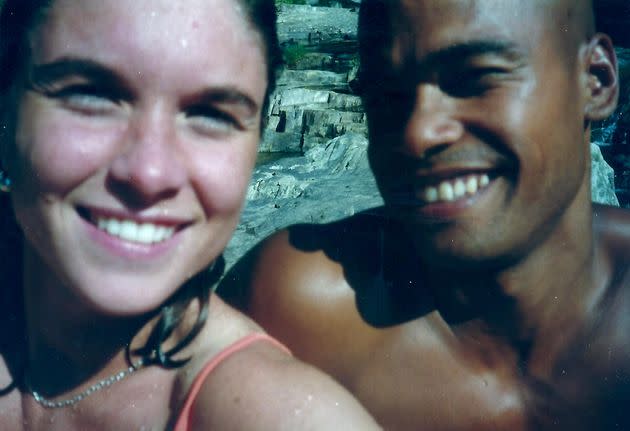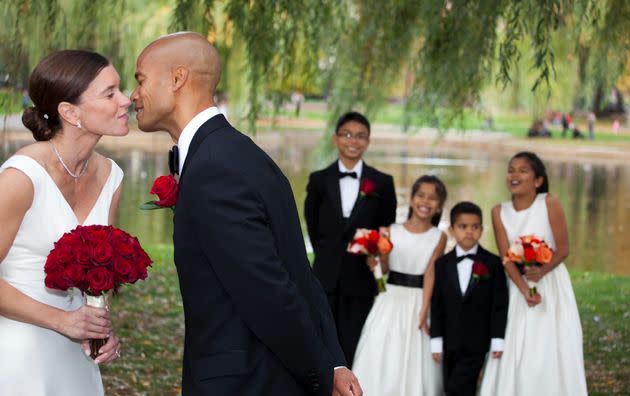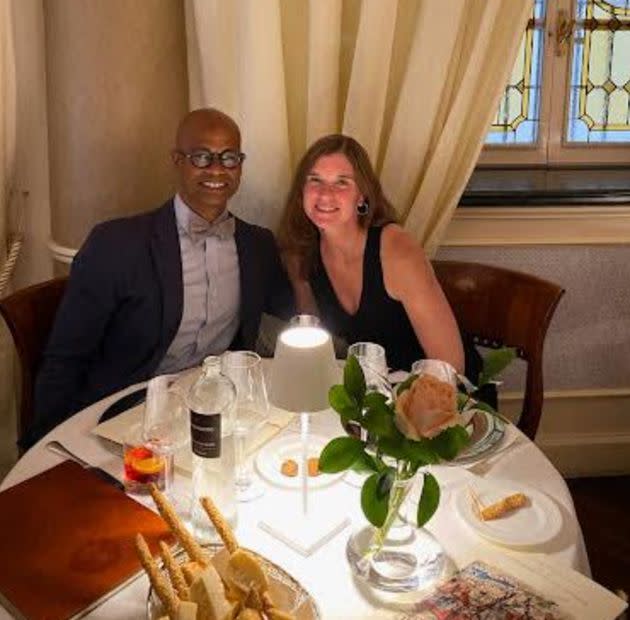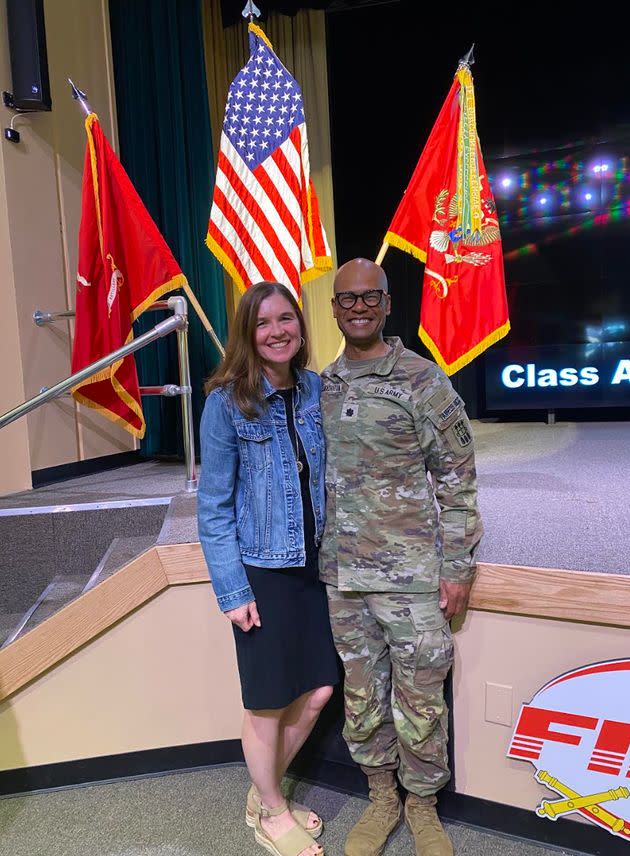We Were About To Become Empty Nesters. Then My Husband Made A Shocking Decision That Changed Everything.
We lie in bed tangled up in the sheets on a Monday night, savoring the little time we have left before my husband will leave for a month. There are piles of military uniforms folded neatly and stacked high on the dresser. His camouflage bags are scattered on the floor.
My husband’s decision to join the Army — at age 55, no less — is no longer an abstraction that will come to pass sometime in the distant future. He leaves in six days.
We have been married for 24 years, and this is the longest we will have ever been apart. At this moment, I really do not want to let him go. I want to forget the whole thing and get back to our normal life — the one where we have launched three of our four kids off to college, with only our youngest, age 17, still at home.
He’s our baby boy, but that baby boy is incredibly independent now. In fact, tonight he has driven himself to hockey practice, which is why we have the luxury of lying in bed among the clothes we carelessly tossed off a little while ago.
I want this experience for my husband. I know he has longed to give back to this country, which truly became a land of opportunity for his family when his parents immigrated here nearly 60 years ago. When he was 9 years old, he wrote a letter to then President-elect Jimmy Carter stating, “Even though my skin is brown and I wear glasses, I hope to become president someday.”
The letter resulted in an invitation to President Carter’s inauguration, which his mother proudly took him to on a cold January afternoon in 1977. His desire to serve, born out of gratitude for a life filled with possibilities that his own parents had not had, existed long before we ever met. I want this for him. I am just not so sure I want this for me — or for us.

My husband has been my “person” for more than half my life. We met when I was fresh out of school, a 23-year-old nurse taking care of one of his patients. He was a first-year surgical resident. He asked my coworker for permission to look up my phone number on the Rolodex at the nurses’ station.
“A what?” my kids would ask whenever we recounted this story. Those were the early days before we settled down and bought a house, which, over the course of seven years, gradually filled until we had four children.
Raising our kids kept us busy — in so many good ways, but busy nonetheless. People, mostly parents themselves, would remind me of that old saying, “The days are long, but the years are short.” At that time, the days mostly felt long to me. Now I look back on them with nostalgia while I sit in a very quiet house.
Some nights, I miss hearing little bare feet running down the hallway to our bed after a bad dream. Time has raced by faster than I could have predicted — just as all those people promised me it would.
I always thought when our nest was empty, my husband and I would have the freedom to do whatever we pleased. I fantasized about a more mature version of life in our 20s — less responsibility, more freedom. We could eat cereal for dinner or hop in the car on a Friday and see where the road took us. Perhaps I imagined doing what we are doing tonight — stripping off our clothes and jumping into bed. My husband joining the Army was never part of that vision.
Everything changed one day as he and I were driving home from New York City to Boston a few years ago. We had just dropped our son off at college. At that time, we had two kids who had left the house and two still living with us.
I am grateful that he was the one driving. If I had been behind the wheel when he told me he wanted to join the Army’s medical corps, I might have slammed on the brakes right there in the middle of the Merritt Parkway. If I had not been what suddenly felt like trapped in that vehicle, I might have run. Maybe this is why he chose that moment to broach the topic.
He explained the details of this military program for surgeons. It involved a total commitment of two years and required several one-month training sessions and one weekend away at a domestic base each month. All of these sessions would prepare him to set up a field hospital and command the unit that ran it.
Sometime during those two years, my husband would be deployed for three months to implement all the skills he had learned while caring for soldiers. He would not know the location of his deployment for some time. He would keep his regular job in Boston, and we would not need to relocate. After his commitment was fulfilled, he would be given the option — not the requirement — to renew for another two years, which he assured me he would not do without my agreement.

I wanted to scream. I did not want him to leave just as we were about to have more time together. It all seemed so unnecessary. The house felt as if it had been emptying so quickly already.
And then there were the logistics and all of the responsibilities that would become all mine while he was gone: the dogs, the house, our kids. Beyond that, there was the danger that looms anytime someone heads off into an area of conflict — the risk of harm, or worse. I could barely stomach those thoughts. Instead, I focused on the burden — and with it came anger, which was easier to concentrate on than the fear lying just beneath it.
Our conversation continued for nearly a year. My anger eventually began to fade and gave way to a new perspective. I was able to see his decision as being about generosity and sacrifice and service in its truest sense. I was able to see it as a testament to the character of the man I had married, not a mark against him. It was a reminder of why I fell in love with him in the first place and still love him all these years later.
The recruiter, who looked young enough to be my son, flew across the country to meet with me. He called me “ma’am” and answered my questions as we sat on my front porch on a hot summer afternoon. After gaining a greater understanding of what would be required, I agreed to the two-year commitment.
This did not happen immediately after the recruiter’s visit — first, I had to conduct a personal inventory of my own dreams and how they fit into our life going forward.
I always thought when our nest was empty, my husband and I would have the freedom to do whatever we pleased.
When the world shut down due to COVID in 2020, I made two important changes. I ended a years-long dance with alcohol — one where I was no longer always leading the steps. My husband embraced my choice, which evolved into a lifestyle. When I turned 50 a few years later, he threw me a small surprise birthday party and served only mocktails. There was not a drop of alcohol, even though some of our guests may have enjoyed a drink.
The second change I made was returning to writing, a craft I had loved when I was young. I began to hide out in my office with the door closed whenever I could and immersed myself in reading and writing. I even signed up for a writing class.
One day, I mentioned to my husband I wanted to read something by William Faulkner. The next morning, as I was writing with my office door closed, out of the corner of my eye, I saw the door open ever so slightly. My husband reached into the room with his tattered copy of “As I Lay Dying” that he has had since college and placed it on my desk. He did not speak or interrupt my creative space, he just set down his beautiful gift and left me to work.

I reflected on many instances like this I’ve experienced during our life together. In each memory, my husband is at my side encouraging and nurturing me. He has been my most ardent supporter, and now it is my turn. He wants to use his skills in a new way — to delicately remove bullets, pack wounds, and save limbs. He wants to repair and suture those who risk injury and death to protect our country. To protect the freedom his parents were granted when they arrived in the United States in the early 1960s.
I have the choice to support him or not. There is only one right answer for me.
We have told our family and friends about his decision to enlist. The first question that most of them ask is, “Will you be deployed?” We tell them what we know and explain that he could end up somewhere far from conflict where soldiers are airlifted in for surgery. He could also be sent to set up a hospital somewhere that is so close to active fighting that he could hear it from his tent.
Our kids are incredibly proud of the decision. Many people thank my husband for his service. Some ask, “Is this something you actually want to do?” His steady response to this question is always, “I was not drafted, if that is what you are asking.” Some people turn their heads to me, and ask, “Are you OK with this?”
I have learned that love demands sacrifice, compromise, and risk. It means supporting your partner through moments of uncertainty, even when you feel afraid — maybe especially when you feel afraid.
The truth is, I am afraid that he could be wounded, and I’m worried that my kids and I could someday be standing next to a casket draped in an American flag. Still, my honest reply is always the same: “Yes, I am OK with it and I will support him through it all.”
How could I not? That would mean standing in the way of a dream. But I am also excited for him. I see the joy on his face when he puts on that uniform. It evokes a sense of pride that can light up a room, and I get a glimpse of that 9-year-old boy with brown skin and glasses writing to President Carter. I have committed to this plan because I am committed to him, to us, and to our journey.
Recently, a colleague invited my husband to a work dinner. He declined, explaining that he would be away on active orders. She congratulated him on his new role and then told him that reinventing ourselves is what keeps us living. That stuck with me.
Loving him — all of the versions of him — and him loving me back in that same way is part of the reason our marriage has lasted this long. I have learned that love demands sacrifice, compromise, and risk. It means supporting your partner through moments of uncertainty, even when you feel afraid — maybe especially when you feel afraid. Standing in the way of aspirations is the opposite of love.

For tonight though, I will relish in him stroking the hair out of my face — something he has done thousands of times. I will take in the feel of my cheek against his bare chest. I will hold all of this with me when he heads off to practice drills with his platoon in six days, and then again when he is deployed overseas. And while so much of me wants to stand in the doorway — to cling to his body and not let him go — I think about his colleague’s words. I think about how he only opened the door to my office a crack and how a room full of people sipped mocktails because of his love.
My husband’s decision to join the Army is my pen to paper. It is my sobriety. It is what keeps us living. It is what keeps us admiring each other after all these years. It is part of the reason we find ourselves tangled up in the sheets tonight. Two middle-aged adults lazing around in bed talking about our next chapter, growing newer and older together.
Jennifer Gangadharan has spent 24 years raising her kids and practicing as a registered nurse. She currently works in substance use and violence prevention in the Boston area. She is currently working on a memoir.
Do you have a compelling personal story you’d like to see published on HuffPost? Find out what we’re looking for here and send us a pitch at pitch@huffpost.com.






